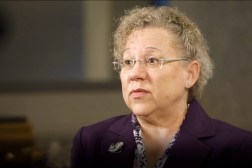Why Chicago’s CIO left government for IoT initiative

Though no longer working in city government, former Chicago chief information officer Brenna Berman said her work will continue on a parallel path from a new position at urban innovation nonprofit UI Labs.
Berman left Chicago after six years of helping the city upgrade its business intelligence and analytics abilities, quietly bolstering the city’s IT sustainability, and assisting on a long-term project to automate the city’s predictive analytics capabilities — a project that’s scheduled for launch sometime in June. The IT leader also helped the city in the early phases of its Array of Things project, a city-scale sensor network designed to help a burgeoning Internet of Things (IoT) space understand its capabilities. With an interest in doing more work in IoT, Berman left the city to lead the City Digital initiative at the Chicago-based UI Labs.
“There will still be a partnership with the mayor’s office, and I think the only reason he was supportive of me moving on was because of where I was going, because I’m still very much aligned with his vision for Chicago being a tech-enabled city and that includes our community,” Berman told StateScoop.
The “UI” in UI Labs stands for “university” and “industry,” and Berman’s work will largely center around building connections between the idealistic research happening around the nation’s educational institutions and the practical one-off devices being launched by private industry.
Berman will also help convene a larger group of cities around problems like municipal water supply. Chicago and Los Angeles, for example, have opposite problems when it comes to water, and so it’s beneficial to have diverse viewpoints when solving these kinds of problems, she said.
“When you think about smart cities, often the focus is on how city government can use IoT to solve their problems, but cities are much bigger than city government. You’ve got nonprofits, you’ve got the private sector,” she said. “Looking for partnerships to bring these types of solutions to the rest of Chicago will make that transformation much more robust.”
As a CIO, Berman managed a wide range of technologies for the city, but the opportunity to do more work with IoT was one she said she couldn’t pass up.
“I think IoT is actually extraordinarily disruptive,” she said. “I think it’s going to be as disruptive to whatever industry you happen to be in — for me, it’s cities — as the internet in general was 15 years ago. Being on the forefront of that kind of change is very exciting. And at the same time, especially in the public sector, it introduces some really interesting challenges in the realm of security and privacy and also the potential to increase the accessibility and [reduce the] digital divide for some people in the city.”
Looking back at the past few years, Berman pointed to the city’s increased competence around the use of data as one of her office’s banner achievements.
“What Chicago has done to make data and analytics a common operating principle for our departments [is impressive],” she said. “It achieves the mayor’s vision of using data and analytics as an information-driving principle for how our departments operate.”
The former CIO also assisted with the creation of an open data portal that attempts to reach a wider audience, and a predictive analytics automation project to launch in June that is intended to ease the strain on the city’s limited data personnel.
One of the best things that happened during Berman’s tenure didn’t get much notice, she said, and that was an internal transformation that included a restructuring of the city’s telecom operations, the creation of a new data center, and migrating applications to the cloud. Things like that make everything more stable and ensure IT will continue to be available to the agencies that depend on it, she said.
“I’m personally really proud of because I had a pretty small but highly talented and dedicated team and year on year we ran a really tight ship that was able to drive strong, innovative operations that saved the city money every year,” she said. “I loved being there. I’ll miss the team and there is nothing quite like serving the residents of your city.”






